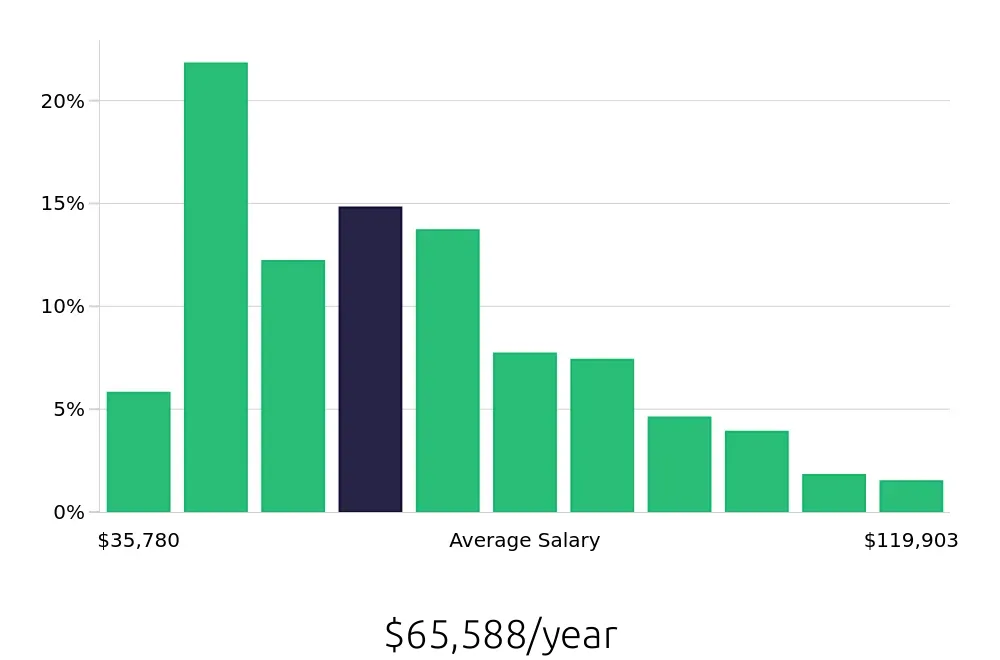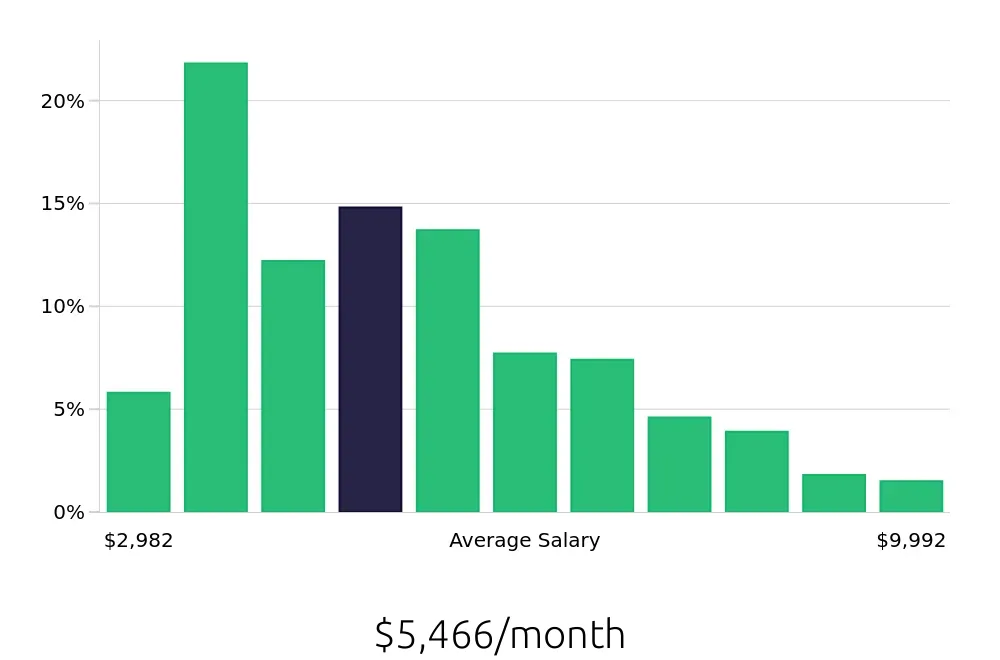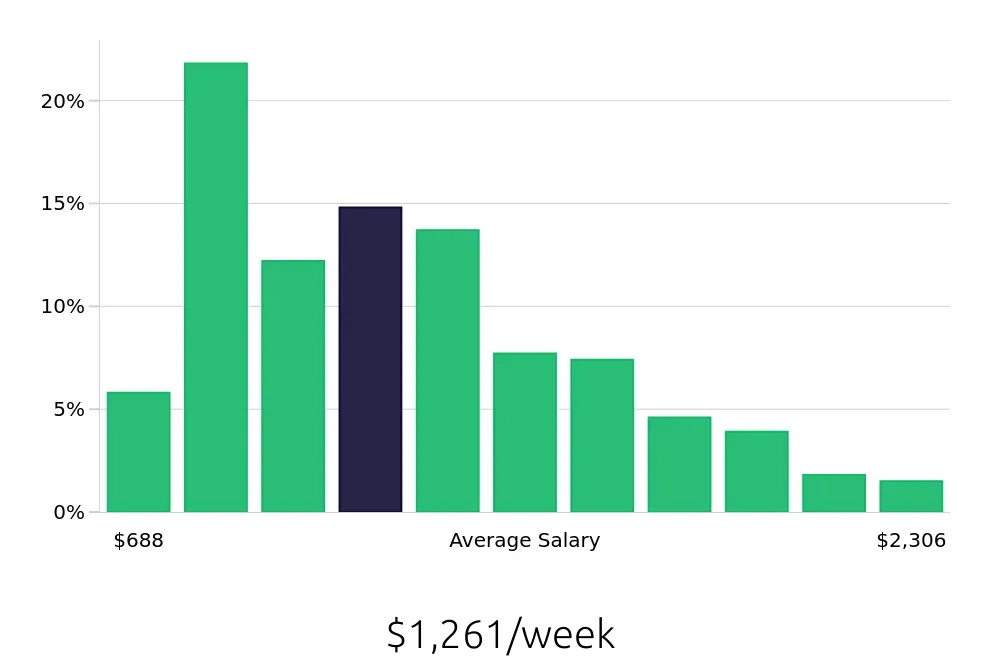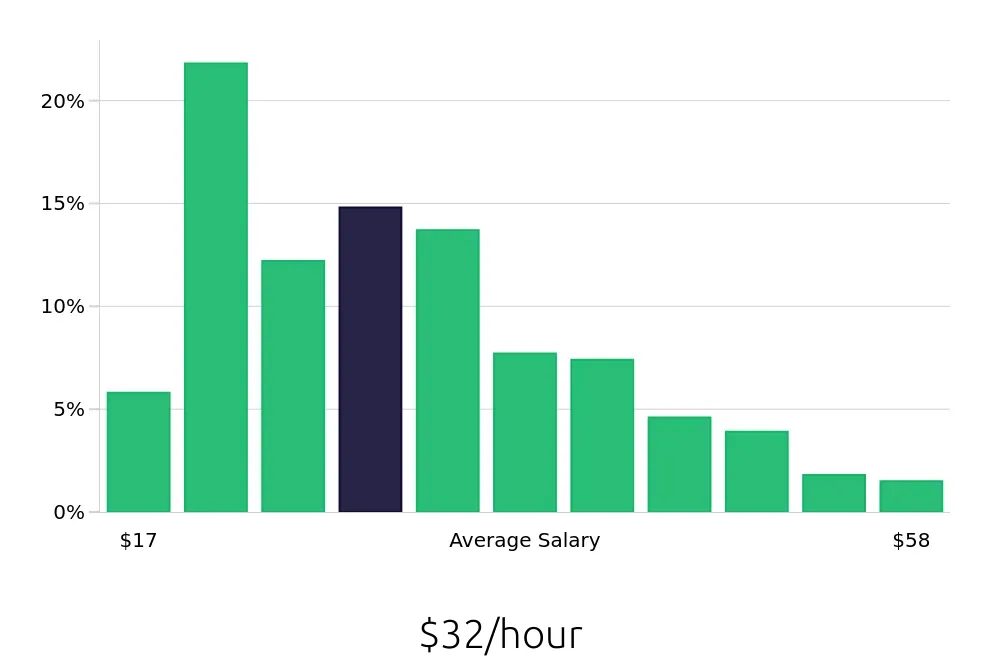How much does a Wildlife Biologist make?
Wildlife biologists study animals and their habitats. They often work for government agencies, non-profits, or research institutions. These professionals help protect wildlife and ensure their environments are safe. They earn a good salary for their important work.
Wildlife biologists earn an average yearly salary of $65,588. This number changes based on experience and location. Some make less, while others earn more. Here is a look at the range of salaries:
- The lowest 10% earn less than $35,780 a year.
- The next 20% earn between $35,780 and $43,428 a year.
- The next 20% earn between $43,428 and $51,075 a year.
- The next 20% earn between $51,075 and $58,723 a year.
- The highest 10% earn more than $112,255 a year.
What are the highest paying cities for a Wildlife Biologist?
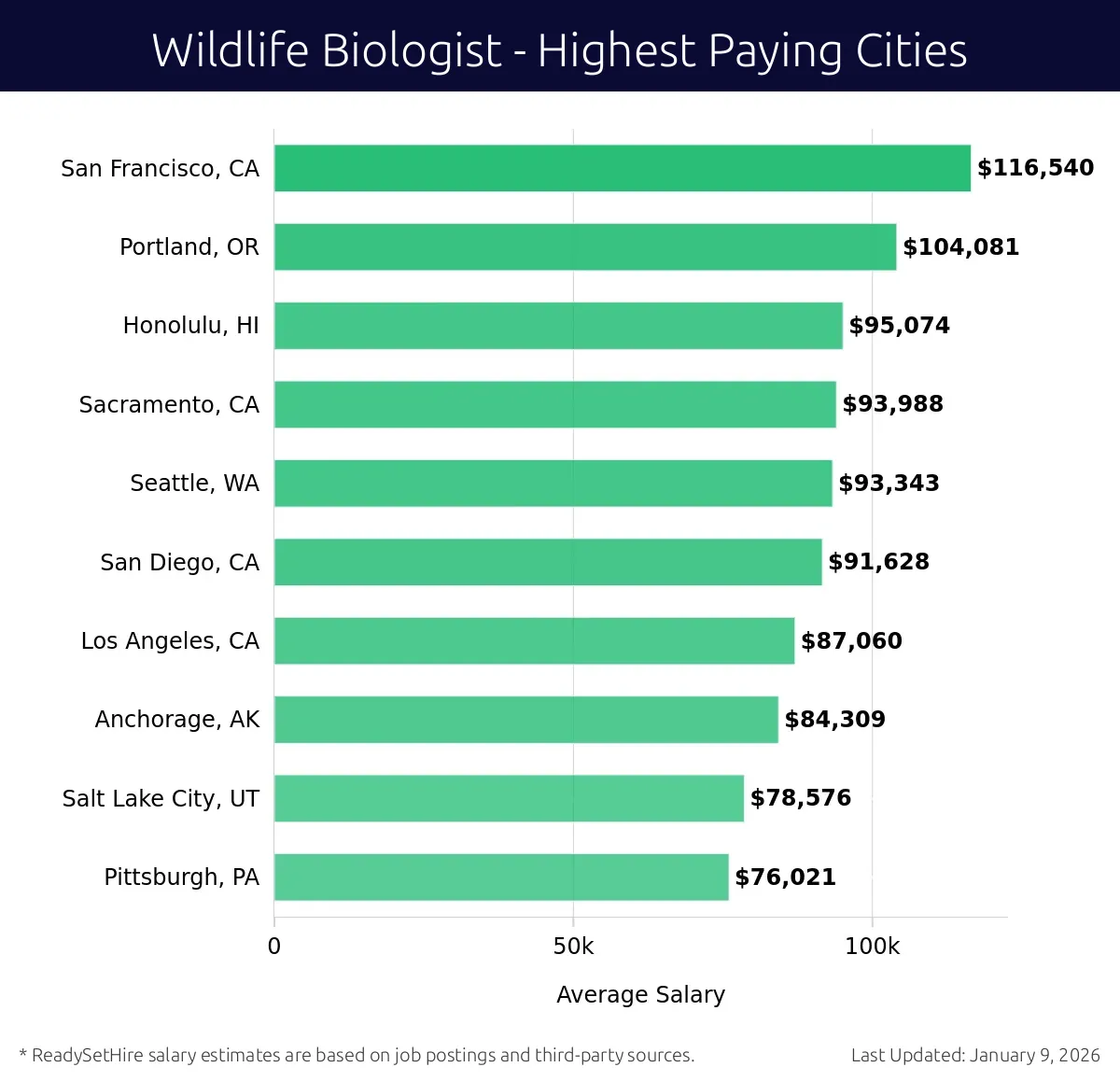
-
San Francisco, CA
Average Salary: $116,540
In San Francisco, professionals enjoy a dynamic environment for those passionate about wildlife. The city's focus on sustainability and environmental protection supports work with various species. Companies like the San Francisco Zoo and the Golden Gate National Recreation Area provide unique opportunities.
Find Wildlife Biologist jobs in San Francisco, CA
-
Portland, OR
Average Salary: $104,081
Portland offers a perfect mix of urban life and natural beauty for wildlife enthusiasts. The city’s commitment to green spaces makes it ideal for those looking to make a difference. Organizations such as the Oregon Zoo and local wildlife nonprofits offer great positions.
Find Wildlife Biologist jobs in Portland, OR
-
Honolulu, HI
Average Salary: $95,074
Working in Honolulu, one can explore unique ecosystems with diverse wildlife. The city’s commitment to preserving native species creates exciting job opportunities. Agencies like the Hawaii Department of Land and Natural Resources often seek professionals to protect local wildlife.
Find Wildlife Biologist jobs in Honolulu, HI
-
Sacramento, CA
Average Salary: $93,988
Sacramento provides a rich landscape for wildlife biologists to work on conservation projects. The city’s commitment to preserving natural habitats supports various species. Local government agencies and environmental organizations offer many opportunities for those interested in wildlife conservation.
Find Wildlife Biologist jobs in Sacramento, CA
-
Seattle, WA
Average Salary: $93,343
Seattle’s strong focus on environmental issues makes it an excellent place for wildlife experts. The city’s lush landscapes and commitment to conservation offer many opportunities. Companies like the Woodland Park Zoo and the Seattle Aquarium often hire biologists to work on diverse projects.
Find Wildlife Biologist jobs in Seattle, WA
-
San Diego, CA
Average Salary: $91,628
San Diego is a great place for those interested in marine and terrestrial wildlife. The city’s focus on conservation and education provides many opportunities. Organizations like the San Diego Zoo and the SeaWorld Research Institute offer exciting positions for wildlife professionals.
Find Wildlife Biologist jobs in San Diego, CA
-
Los Angeles, CA
Average Salary: $87,060
Los Angeles offers diverse environments, from beaches to mountains, for wildlife enthusiasts. The city’s various habitats create many opportunities to study different species. Companies like the Los Angeles Zoo and the Santa Monica Mountains National Recreation Area seek professionals for wildlife conservation.
Find Wildlife Biologist jobs in Los Angeles, CA
-
Anchorage, AK
Average Salary: $84,309
In Anchorage, wildlife experts work in one of the most diverse environments in the U.S. The city’s unique wildlife and rugged landscapes provide many opportunities. Agencies like the Alaska Department of Fish and Game offer positions for those passionate about wildlife conservation.
Find Wildlife Biologist jobs in Anchorage, AK
-
Salt Lake City, UT
Average Salary: $78,576
Salt Lake City provides a perfect blend of urban and natural environments for wildlife professionals. The city’s focus on preserving wildlife and natural habitats offers many opportunities. Local wildlife organizations and government agencies often seek biologists to work on various projects.
Find Wildlife Biologist jobs in Salt Lake City, UT
-
Pittsburgh, PA
Average Salary: $76,021
Pittsburgh offers a mix of urban and natural areas, ideal for those interested in wildlife. The city’s efforts to protect local ecosystems create many opportunities. Companies like the Pittsburgh Zoo & PPG Aquarium and local environmental organizations often hire wildlife experts.
Find Wildlife Biologist jobs in Pittsburgh, PA
What are the best companies a Wildlife Biologist can work for?
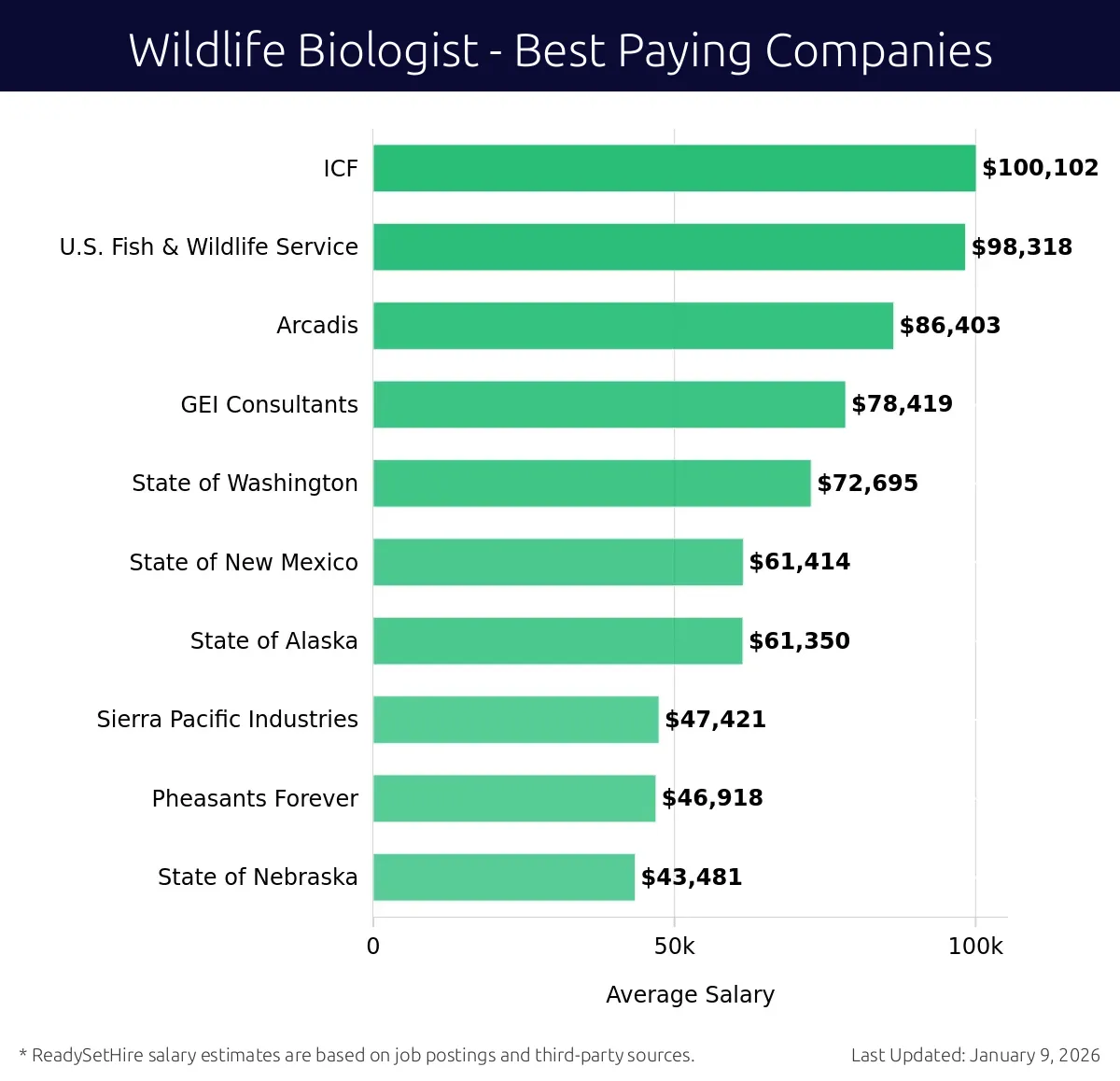
-
ICF
Average Salary: $100,102
ICF provides consulting services for environmental projects worldwide. Wildlife Biologists work on diverse projects, from habitat restoration to species conservation. ICF operates in numerous locations, including the United States, Europe, and Asia.
-
U.S. Fish & Wildlife Service
Average Salary: $98,318
The U.S. Fish & Wildlife Service focuses on protecting wildlife and their habitats. Wildlife Biologists here engage in field research, policy development, and habitat management across the United States.
-
Arcadis
Average Salary: $86,403
Arcadis offers consulting services for environmental and infrastructure projects. Wildlife Biologists here contribute to projects related to wildlife management and habitat conservation. The company operates globally, with major offices in North America, Europe, and Asia.
-
GEI Consultants
Average Salary: $78,419
GEI Consultants focus on environmental and engineering services. Wildlife Biologists at GEI work on projects involving habitat restoration and environmental impact assessments. The company works across the United States and internationally.
-
State of Washington
Average Salary: $72,695
The State of Washington employs Wildlife Biologists in state parks, wildlife reserves, and conservation areas. These professionals conduct research, manage wildlife populations, and develop conservation plans. They work in various locations throughout Washington.
-
State of New Mexico
Average Salary: $61,414
In New Mexico, Wildlife Biologists work for state agencies focused on wildlife management and conservation. They conduct field research, habitat assessments, and species monitoring across the diverse ecosystems of New Mexico.
-
State of Alaska
Average Salary: $61,350
The State of Alaska employs Wildlife Biologists to manage and protect its rich biodiversity. These professionals work in various habitats, from tundra to forests, and focus on wildlife conservation and research.
-
Sierra Pacific Industries
Average Salary: $47,421
Sierra Pacific Industries focuses on forestry and land management. Wildlife Biologists here contribute to projects related to forest management and wildlife habitat protection. The company operates in the western United States.
-
Pheasants Forever
Average Salary: $46,918
Pheasants Forever is a conservation organization dedicated to the preservation of pheasants and their habitats. Wildlife Biologists work on habitat restoration and species conservation projects across the United States.
-
State of Nebraska
Average Salary: $43,481
The State of Nebraska employs Wildlife Biologists to manage wildlife populations and habitats in various regions. They conduct research, habitat assessments, and species monitoring throughout the state.
How to earn more as a Wildlife Biologist?
Working as a Wildlife Biologist can lead to a rewarding career in conservation and research. To maximize earning potential, consider focusing on specific areas that often come with higher pay. Gaining specialized skills and experience can open doors to better-paying positions.
Here are some factors that can help increase your salary as a Wildlife Biologist:
- Advanced Degrees: Earning a Master's or Ph.D. can significantly boost earning potential. Higher education allows access to more complex research and higher-level positions.
- Field Experience: Experience in the field can lead to roles with higher pay. Practical skills gained from fieldwork are highly valued in the industry.
- Specialized Knowledge: Expertise in particular species, ecosystems, or conservation methods can command higher salaries. Specializing can make a biologist more valuable to employers.
- Certifications: Obtaining certifications in areas such as wildlife management or GIS (Geographic Information Systems) can increase earning potential. These skills are in demand and can lead to better-paying jobs.
- Networking: Building a strong professional network can lead to better job opportunities. Networking with other professionals can open doors to higher-paying positions.

